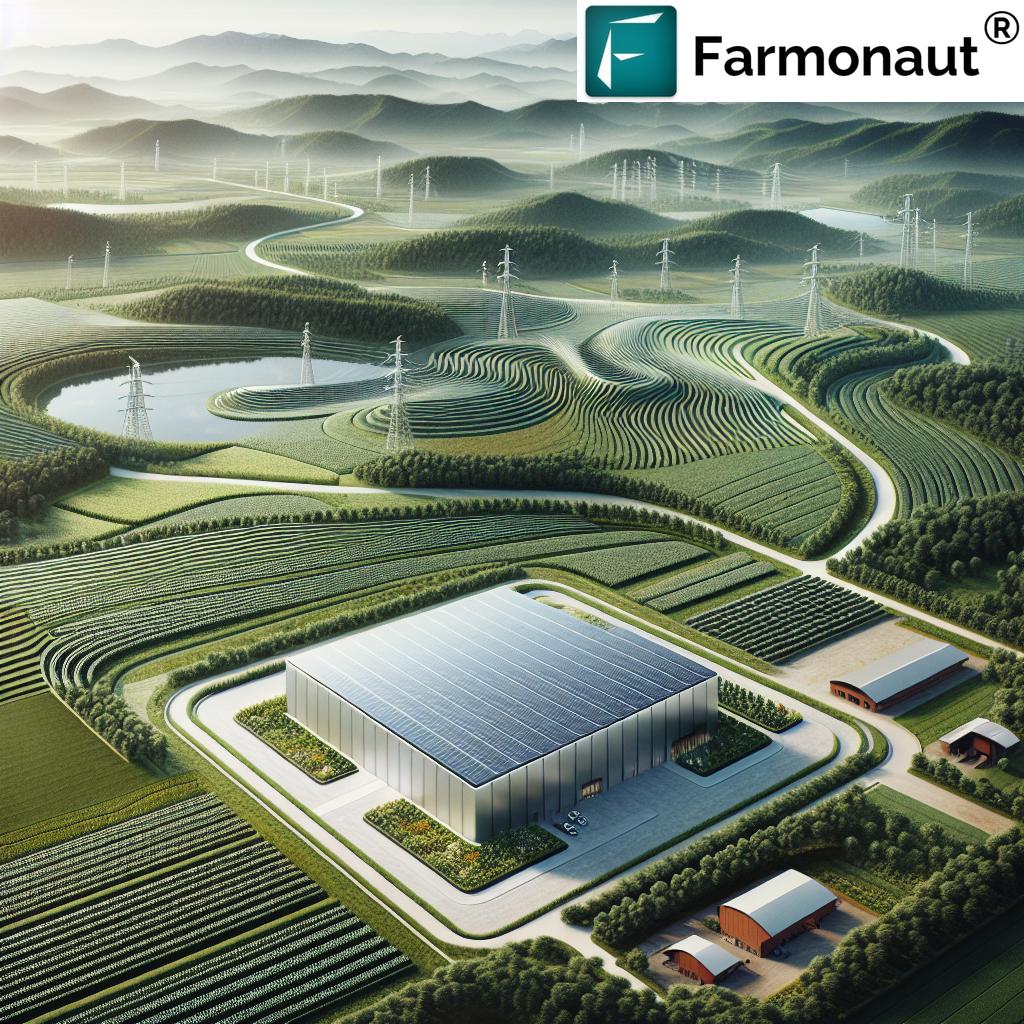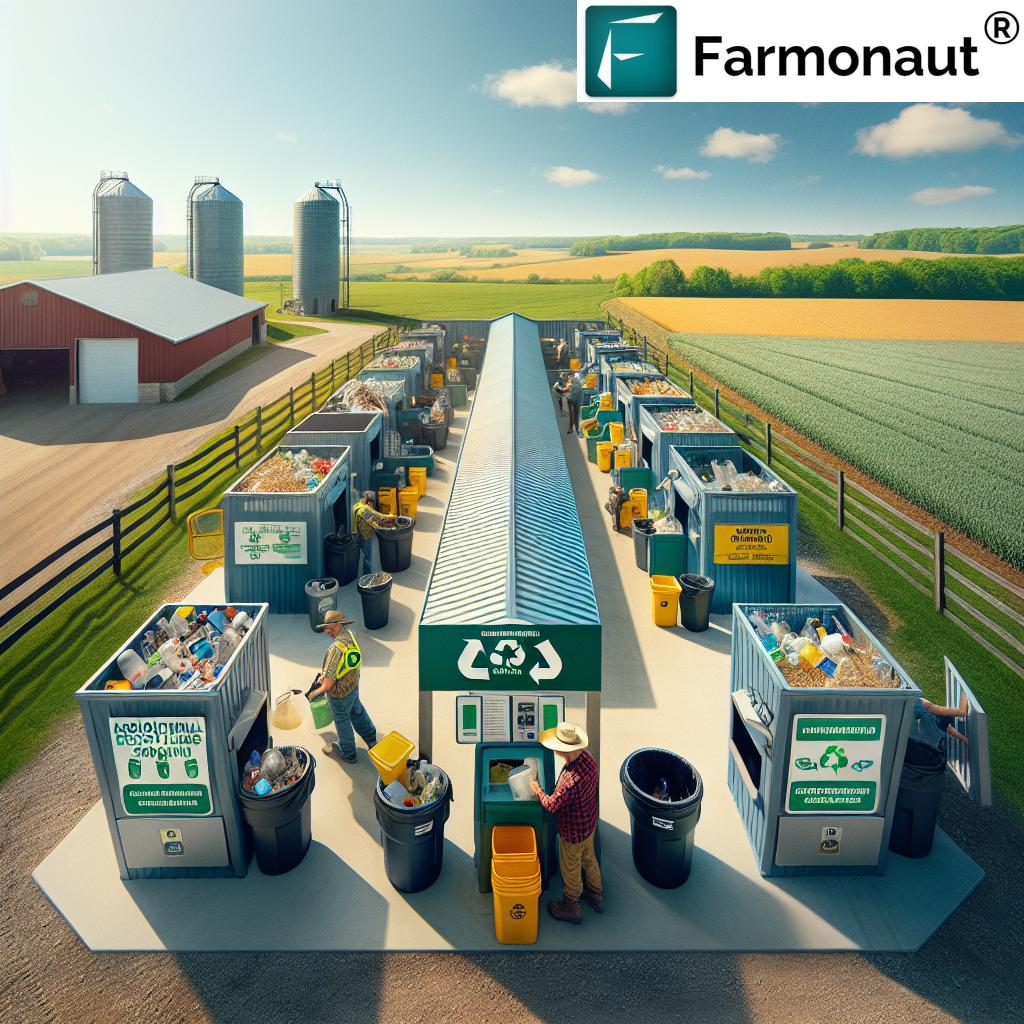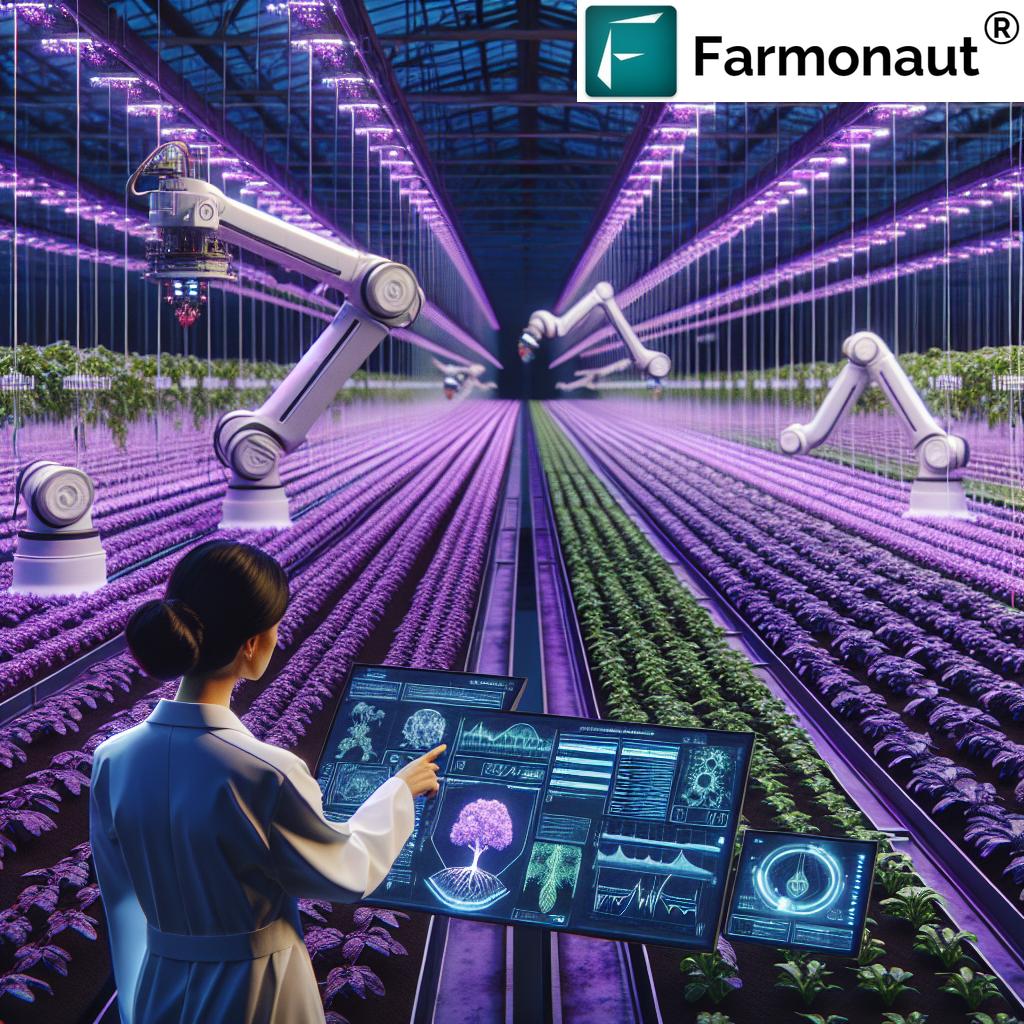Balancing Green Energy and Agriculture: Ontario’s Controversial Battery Storage Facility Sparks Community Debate
“The proposed battery energy storage system (BESS) facility in Ontario has sparked debate over the use of prime agricultural land.”
In the heart of Ontario’s agricultural landscape, a controversy is brewing that highlights the complex interplay between green energy initiatives and sustainable farming practices. The proposed battery energy storage system (BESS) facility in Fergus has ignited a passionate debate among residents, farmers, and local officials. This discussion brings to light the challenges of integrating large-scale energy storage systems with the preservation of vital agricultural resources.
As we delve into this contentious issue, we’ll explore the multifaceted concerns raised by the community and examine how this project reflects broader challenges in adopting green technologies while safeguarding our farming heritage. Our analysis will shed light on the delicate balance between technological progress and environmental stewardship, a balance that is crucial for the future of sustainable agriculture.

The Proposed BESS Facility: A Closer Look
The proposed battery energy storage system facility in Fergus, Ontario, is a project that has captured the attention of the local community and beyond. Let’s break down the key details of this controversial development:
- Location: 6235 Guelph Street, Fergus, Ontario
- Size: 15-acre site
- Capacity: Up to 211 MW
- Components: Approximately 200 batteries, inverters, interconnection substation, water reservoir, and stormwater management facility
- Construction Timeline: Scheduled for Fall 2025
- Operational Period: Until decommissioning in 2052
The facility, proposed by Aypa Power, has already received initial council support. However, as more details emerge, residents and local organizations are raising significant concerns about its potential impact on the community and the environment.
Community Concerns: Voices from Fergus
The recent public meeting in Fergus revealed a deep-seated apprehension among residents regarding the BESS facility. Here are some of the primary concerns voiced by the community:
- Agricultural Land Preservation: Janet Harrop, representing the Wellington Federation of Agriculture, emphasized the potential adverse effects on prime agricultural land. The facility’s size contradicts current zoning bylaws that permit BESS facilities on farmland only as a minor use.
- Safety Concerns: Longtime resident Anthea Millikin expressed fears about potential fire hazards, particularly in light of a fire incident at Aypa’s Brantford facility last September.
- Environmental Risks: The community group Save Our Water, represented by Donna McCaw, called for caution due to potential threats to local water quality and safety.
- Foreign Influence: Resident Paul Roberts voiced concerns about an American corporation potentially jeopardizing local developments.
These concerns highlight the complex interplay between green technology adoption and the preservation of local agricultural practices and resources.
Zoning and Land Use: A Critical Point of Contention
One of the most significant issues raised during the public meeting was the conflict between the proposed BESS facility and existing zoning bylaws. Current regulations permit BESS facilities on farmland only as a minor use, allowing up to two percent of the land, not exceeding one hectare. The proposed 15-acre facility far exceeds these limitations, raising questions about the integrity of zoning regulations and their role in protecting agricultural land.
This discrepancy has sparked a broader discussion about agricultural land use zoning and the need for clear guidelines when it comes to integrating green energy projects into farming communities. The debate touches on several key points:
- The importance of preserving prime agricultural lands for food production
- The role of zoning in supporting farm income diversification without compromising land resources
- The challenge of balancing renewable energy goals with agricultural preservation
- The need for comprehensive planning that considers both short-term energy needs and long-term food security
As we navigate these complex issues, it’s crucial to consider how precision agriculture technologies, like those offered by Farmonaut, can play a role in maximizing land use efficiency and supporting sustainable farming practices.
Safety and Environmental Concerns: A Balancing Act
“Community concerns include potential fire hazards and environmental risks associated with large-scale energy storage systems in rural areas.”
The safety and environmental implications of the proposed BESS facility have emerged as primary concerns for the Fergus community. These apprehensions stem from various factors:
- Fire Hazards: The incident at Aypa’s Brantford facility has heightened awareness of potential fire risks associated with large-scale battery storage systems.
- Water Quality: Concerns about the facility’s impact on local water resources and quality have been raised by community groups.
- Long-term Environmental Impact: Questions persist about the facility’s effects on soil health and the surrounding ecosystem over its 27-year operational lifespan.
While Aypa Power has assured the public that they have designed the facility with sufficient safety measures, including a 600-foot setback from major roads and comprehensive fire safety protocols, skepticism remains among residents. This situation underscores the importance of transparent communication and rigorous environmental impact assessments in green technology projects.
The Role of Precision Agriculture in Sustainable Development
As we grapple with the challenges posed by the BESS facility, it’s essential to consider how advanced agricultural technologies can contribute to more sustainable and efficient land use. Precision agriculture technologies, such as those provided by Farmonaut, offer valuable tools for optimizing farm productivity while minimizing environmental impact.
Farmonaut’s satellite-based farm management solutions provide farmers with real-time insights into crop health, soil moisture levels, and other critical metrics. These tools enable more efficient resource management, potentially reducing the pressure to convert agricultural land for other uses. By leveraging such technologies, we can work towards a future where green energy initiatives and sustainable farming practices coexist harmoniously.
Balancing Act: Green Technology and Agricultural Preservation
The controversy surrounding the BESS facility in Fergus exemplifies the broader challenges faced by communities as they strive to balance green energy initiatives with agricultural preservation. This delicate equilibrium involves several key considerations:
- Land Use Efficiency: Maximizing the productivity of existing agricultural lands through smart farming solutions can reduce the pressure to repurpose farmland for energy projects.
- Integrated Planning: Developing comprehensive plans that consider both energy needs and agricultural sustainability is crucial for long-term community development.
- Technological Innovation: Embracing agritech solutions that enhance farm productivity while supporting environmental conservation can create win-win scenarios.
- Community Engagement: Ensuring transparent communication and meaningful community involvement in decision-making processes is essential for successful project implementation.
As we navigate these complex issues, it’s important to consider how innovative solutions like those offered by Farmonaut can contribute to more sustainable and efficient agricultural practices, potentially easing the tension between land use for energy and farming.
The Economic Perspective: Farm Income Diversification
One of the arguments in favor of projects like the BESS facility is the potential for farm income diversification. Leasing land for energy projects can provide farmers with an additional revenue stream, potentially supporting the financial sustainability of agricultural operations. However, this benefit must be weighed against the long-term implications for soil health, water resources, and overall agricultural productivity.
Farmonaut’s precision agriculture technologies offer an alternative approach to farm income diversification. By optimizing crop yields, reducing input costs, and improving resource management, these tools can enhance farm profitability without compromising valuable agricultural land. This technology-driven approach aligns with the principles of sustainable agriculture while supporting the economic viability of farming communities.
Environmental Stewardship and Soil Conservation
At the heart of the BESS facility debate lies a fundamental concern for environmental stewardship and soil conservation. The potential impact of large-scale energy storage systems on soil health and local ecosystems cannot be overlooked. As we consider the merits of such projects, it’s crucial to prioritize practices that maintain and enhance soil quality, protect water resources, and support biodiversity.
Farmonaut’s technologies contribute to these goals by providing farmers with detailed insights into soil health and moisture levels. By enabling more precise application of inputs and irrigation, these tools help minimize the environmental footprint of agricultural operations. This approach to farming aligns with the broader goals of sustainability and environmental conservation that are central to the concerns raised by the Fergus community.

The Path Forward: Integrating Green Technology with Sustainable Agriculture
As we look to the future, it’s clear that the integration of green technology with sustainable agriculture will be crucial for meeting both our energy needs and food security goals. The controversy surrounding the BESS facility in Fergus highlights the need for a more holistic approach to community development that considers:
- Comprehensive land use planning that prioritizes the preservation of prime agricultural lands
- Investment in agricultural technologies that enhance productivity and sustainability
- Development of clear guidelines for integrating energy projects into rural and agricultural areas
- Robust community engagement processes that ensure local voices are heard and respected
- Ongoing research into the long-term impacts of energy storage facilities on agricultural environments
By embracing smart farming solutions and precision agriculture technologies, we can work towards a future where green energy and sustainable farming coexist harmoniously, supporting both our environmental goals and the prosperity of agricultural communities.
Comparative Analysis: BESS Facility Impact on Agricultural Community
| Aspect | Potential Benefits | Potential Concerns |
|---|---|---|
| Land Use | Diversification of land use (2% of farmland) | Loss of prime agricultural land (15 acres) |
| Farm Income | Additional revenue stream for farmers (estimated 5-10% increase) | Potential long-term decrease in agricultural productivity |
| Environmental Impact | Support for renewable energy integration | Risks to soil health and water quality |
| Safety | Enhanced grid stability and power reliability | Fire hazards and potential for accidents |
| Community Development | Job creation and local economic boost | Changes to rural character and potential property value impacts |
This comparative analysis highlights the complex trade-offs involved in integrating large-scale energy storage facilities into agricultural communities. While there are potential economic benefits, the concerns regarding land use, environmental impact, and community safety cannot be overlooked. It’s crucial for decision-makers to carefully weigh these factors and consider alternative solutions that can achieve energy goals while preserving agricultural resources.
The Role of Technology in Sustainable Agriculture
As we grapple with the challenges posed by projects like the BESS facility, it’s important to consider how technology can offer solutions that support both energy needs and agricultural sustainability. Farmonaut’s precision agriculture technologies exemplify how innovative tools can enhance farm productivity while promoting environmental stewardship.
By leveraging satellite imagery, AI, and machine learning, Farmonaut provides farmers with valuable insights that can:
- Optimize crop yields through precise monitoring of crop health and soil conditions
- Reduce resource waste by enabling targeted irrigation and fertilizer application
- Support sustainable farming practices through data-driven decision-making
- Enhance farm income without compromising valuable agricultural land
These technologies represent a pathway to achieving the goals of both green energy advocates and agricultural preservationists by maximizing the efficiency and sustainability of existing farmland.
Explore Farmonaut’s API for advanced agricultural solutions
Community Engagement and Decision-Making
The controversy surrounding the BESS facility in Fergus underscores the importance of robust community engagement in decision-making processes. As we move forward, it’s crucial to establish frameworks that ensure:
- Transparent communication of project details and potential impacts
- Meaningful consultation with local residents, farmers, and community organizations
- Incorporation of community feedback into project planning and design
- Ongoing dialogue between project developers, local officials, and residents
By fostering open and inclusive discussions, we can work towards solutions that balance the needs of energy infrastructure with the preservation of agricultural communities and resources.
The Future of Sustainable Agriculture and Green Energy
As we look to the future, it’s clear that the integration of sustainable agriculture and green energy will be crucial for meeting our environmental and food security goals. The debate surrounding the BESS facility in Fergus serves as a catalyst for broader discussions about how we can achieve this integration in a way that respects local communities and preserves vital agricultural resources.
Key considerations for the future include:
- Developing comprehensive land use policies that prioritize the preservation of prime agricultural lands
- Investing in research and development of energy storage technologies that have minimal impact on agricultural environments
- Promoting the adoption of precision agriculture technologies to enhance farm productivity and sustainability
- Exploring innovative approaches to integrating renewable energy generation with active farming practices
- Establishing clear guidelines and best practices for the development of energy projects in rural and agricultural areas
By embracing a holistic approach that leverages technology, respects community values, and prioritizes environmental stewardship, we can work towards a future where green energy and sustainable agriculture coexist harmoniously.
Access Farmonaut’s API Developer Docs for integration guidance
Conclusion: Striking a Balance for Sustainable Progress
The controversy surrounding the proposed BESS facility in Fergus, Ontario, serves as a microcosm of the broader challenges we face in balancing green energy initiatives with agricultural preservation. As we’ve explored throughout this discussion, the issues at stake are complex and multifaceted, touching on land use, environmental impact, community safety, and the future of sustainable farming.
While the debate continues, it’s clear that finding solutions will require a collaborative approach that brings together diverse stakeholders, including farmers, energy developers, local officials, and community members. By leveraging innovative technologies like those offered by Farmonaut, we can work towards a future where agricultural productivity is maximized, environmental resources are protected, and energy needs are met in a sustainable manner.
As we move forward, it’s crucial that we remain committed to open dialogue, rigorous scientific assessment, and creative problem-solving. Only through these efforts can we hope to strike the delicate balance between green energy development and the preservation of our vital agricultural heritage.
FAQs
- Q: What is a Battery Energy Storage System (BESS) facility?
A: A BESS facility is a large-scale installation that uses batteries to store electrical energy for later use, helping to balance the electricity grid and support renewable energy integration. - Q: Why is the proposed BESS facility in Fergus controversial?
A: The facility is controversial due to concerns about its size, location on prime agricultural land, potential safety risks, and environmental impacts. - Q: How can precision agriculture technologies help in this situation?
A: Precision agriculture technologies, like those offered by Farmonaut, can help optimize farm productivity, potentially reducing the need to repurpose agricultural land for other uses. - Q: What are the main concerns raised by the community regarding the BESS facility?
A: The main concerns include loss of agricultural land, fire safety risks, potential environmental impacts, and changes to the rural character of the area. - Q: How does the proposed facility conflict with current zoning bylaws?
A: Current bylaws permit BESS facilities on farmland only as a minor use (up to 2% of land, not exceeding one hectare), while the proposed facility is much larger at 15 acres.




















